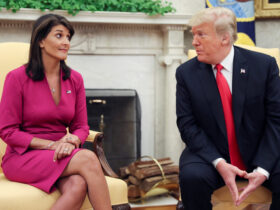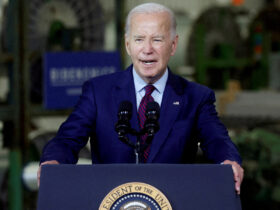United State: The recent camaraderie displayed by Speaker Mike Johnson towards the Democratic hierarchy on this particular Tuesday, garnering their endorsement, stands as a conspicuous warning signal for staunch adherents of authentic conservative principles. It represents an egregious act of disloyalty, suggesting that Johnson prioritizes the facade of bipartisanship over advocating for the ideals that propelled Republicans to triumph.
The declarations made by Representatives Marjorie Taylor Greene and Thomas Massie outside the Capitol on Wednesday unequivocally delineate their stance, heralding a forthcoming vote on Greene’s motion to depose Johnson “in the forthcoming week.” Their accusations against him carry weight and validity: capitulating on governmental financial allotments, encroaching upon the privacy rights of American citizens, and funneling resources into Ukraine without first fortifying our own borders. This isn’t merely feeble leadership—it starkly contradicts the foundational tenets that ought to steer a Republican Speaker.
Johnson’s retort to these allegations is woefully inadequate. His flippant dismissal of Greene’s legislative gravitas is especially egregious, given her steadfast dedication to upholding core conservative tenets. It’s apparent that Johnson’s true allegiance lies not with the conservative constituency but with Democratic interests, as evidenced by his actions such as reauthorizing FISA without robust safeguards for Americans’ privacy and acquiescing on Ukrainian funding without advocating for our national priorities.
Marjorie Taylor Greene’s scathing rebuke during the press briefing underscores a painful reality: under Johnson’s stewardship, the Republican House is failing to make good on the promises that secured their majority. “We clinched victory in the House in 2022,” Greene aptly pointed out, “but what tangible accomplishments have we realized?” This rhetorical inquiry strikes at the crux of the matter: Johnson’s leadership is squandering a prime opportunity to enact a resolute conservative agenda.
Moreover, Greene’s poignant portrayal of brandishing a cerulean “MUGA” hat as a symbol of Johnson’s misaligned priorities—prioritizing foreign interests over domestic exigencies—resonates profoundly. It vividly underscores how Johnson’s leadership diverges from the values upheld by those who elected him and his peers to Washington.
Thomas Massie’s refusal to acquiesce to the inevitability of defeat in the impending vote and his denunciation of the establishment’s deceitfulness manifest a tenacious spirit sorely required. He is justified in contesting resignation to the status quo, emphasizing that the struggle itself, irrespective of the outcome, is pivotal for transparency and for holding leaders accountable.
The imminent motion to vacate, necessitating immediate House action, transcends mere procedural formality; it serves as a pivotal litmus test for every Republican in the House. Will they align with a Speaker who panders to Democratic inclinations, or will they advocate for the principles that underpin their party and were endorsed by their constituents?
At a juncture when stalwart conservative leadership is imperative, Johnson’s conciliatory approach is perilously out of sync with the Republican base. Greene, Massie, and their compatriots are not merely contesting a Speaker; they are endeavoring to reclaim the Republican Party’s essence from those inclined to dilute its principles for bipartisan acquiescence. It’s a struggle that resonates with the core beliefs of many conservatives: leadership ought to be grounded in principle, transcending mere political expediency.
















